Daily Vocabulary Words: List of Daily Used Words in Leading International Newspapers
Hi there. Welcome to this special section @ Wordpandit.
Our endeavour here is very simple: to highlight important daily vocabulary words, which you would come across in leading newspapers in the country. We have included the following newspapers in our selection:
• The New York Times
• The Washington Post
• Scientific American
• BBC
• The Guardian
• Psychology Today
• Wall Street Journal
• The Economist
We are putting in extensive work for developing your vocabulary. All you have got to do is be regular with this section and check out this post on a daily basis. This is your repository of words that are commonly used and essentially, we are posting a list of daily used words. Hence, this has significant practical application as it teaches you words that are used commonly in leading publications mentioned above.
Visit the website daily to learn words from leading international newspapers.
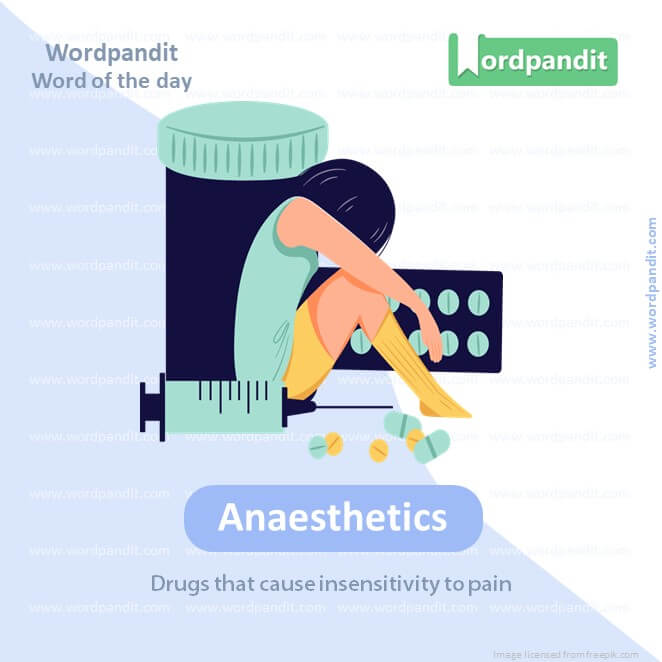
WORD-1: Anaesthetics
CONTEXT: In a significant medical breakthrough, researches have discovered new forms of anaesthetics that are safer and faster acting.
SOURCE: The Times of India
EXPLANATORY PARAGRAPH: Imagine you have a toy and you want to fix something inside it, but you don’t want the toy to feel any pain. Anaesthetics are like magic potions that doctors use to make sure people don’t feel pain during surgery. It helps them to sleep and not feel anything, so when they wake up, everything is fixed!
MEANING: Drugs that cause insensitivity to pain (noun).
PRONUNCIATION: an-uh-STHET-iks
SYNONYMS: Sedatives, Painkillers, Anodynes, Numbings, Tranquilizers, Analgesics, Narcotics
USAGE EXAMPLES:
1. The surgeon ensured the anaesthetics were administered before the operation began.
2. She was nervous about the procedure, but the anaesthetics made her feel relaxed and drowsy.
3. Different surgeries might require different types of anaesthetics.
4. The development of modern anaesthetics has greatly improved medical surgeries.
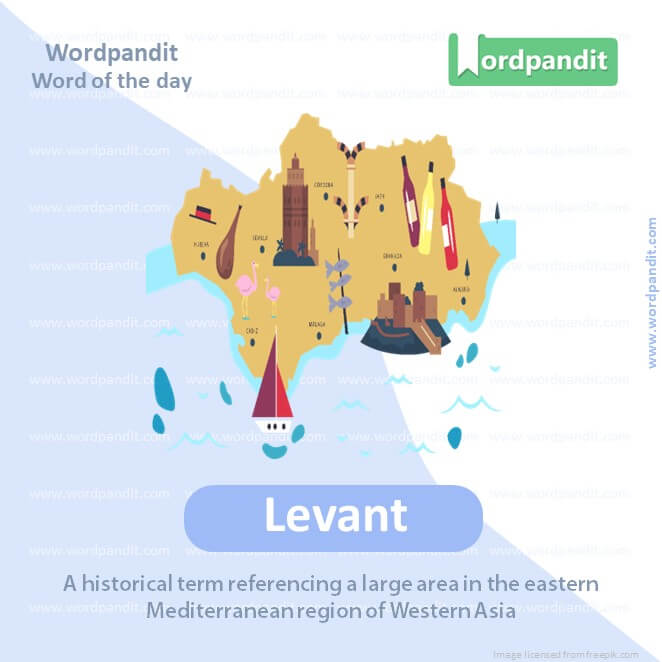
WORD-2: Levant
CONTEXT: Historians have unearthed new information about the economic systems in the Levant during the medieval period.
SOURCE: Indian Express
EXPLANATORY PARAGRAPH: Levant is like a big neighborhood where many countries live next to each other near the sea. These countries have beautiful beaches, old cities, and yummy foods!
MEANING: A historical term referencing a large area in the eastern Mediterranean region of Western Asia (noun).
PRONUNCIATION: luh-VANT
SYNONYMS: Eastern Mediterranean, Near East, Middle East, Eastern seaboard, Coastal Region
USAGE EXAMPLES:
1. She traveled across the Levant exploring ancient ruins.
2. The Levant has a rich history that dates back thousands of years.
3. Many merchants in the old days would trade goods in the Levant.
4. The cuisine of the Levant is diverse and flavorful.
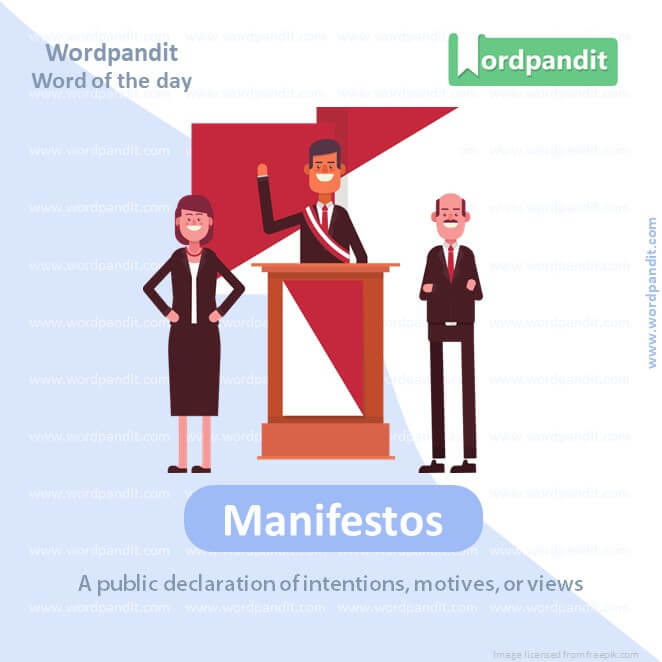
WORD-3: Manifestos
CONTEXT: Confronting the controversies, leading political parties have published their election manifestos, sparking fresh debates across the nation.
SOURCE: Hindustan Times
EXPLANATORY PARAGRAPH: Imagine you have a big idea, and you write it down in a special letter to share with everyone. That letter is called a manifesto. It’s like telling everyone, “Hey, this is what I believe and what I want to do!”
MEANING: A public declaration of intentions, motives, or views (noun).
PRONUNCIATION: man-uh-FES-toes
SYNONYMS: Declarations, Proclamations, Announcements, Statements, Decrees, Platforms, Pronouncements
USAGE EXAMPLES:
1. The artist released a manifesto explaining his vision for the future of art.
2. Different political parties have their own manifestos.
3. The revolutionary’s manifesto inspired many to join his cause.
4. Many manifestos have changed the course of history.
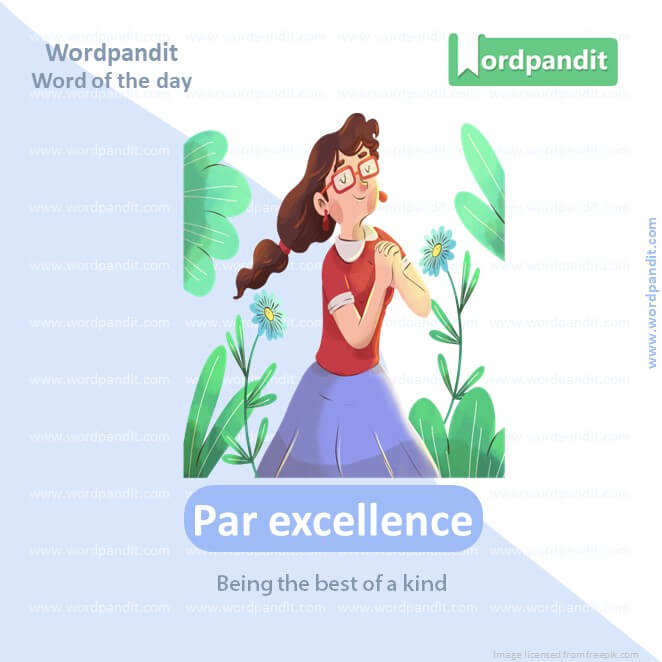
WORD-4: Par excellence
CONTEXT: The movie epitomizes the phrase Par Excellence, as the cinematography and narration were acclaimed by critics as among the best seen in Indian cinema.
SOURCE: The Times of India
EXPLANATORY PARAGRAPH: Imagine you have a toy that is the best toy among all your toys. “Par excellence” is like saying “This toy is the very, very best!”
MEANING: Being the best of a kind (phrase/adjective).
PRONUNCIATION: par eks-uh-LENS
SYNONYMS: Supreme, Premier, Unsurpassed, Ultimate, Prime, First-rate, Top-notch
USAGE EXAMPLES:
1. He is an athlete par excellence.
2. The concert was a musical performance par excellence.
3. The chef’s special dish is par excellence in taste.
4. The museum showcased art par excellence.
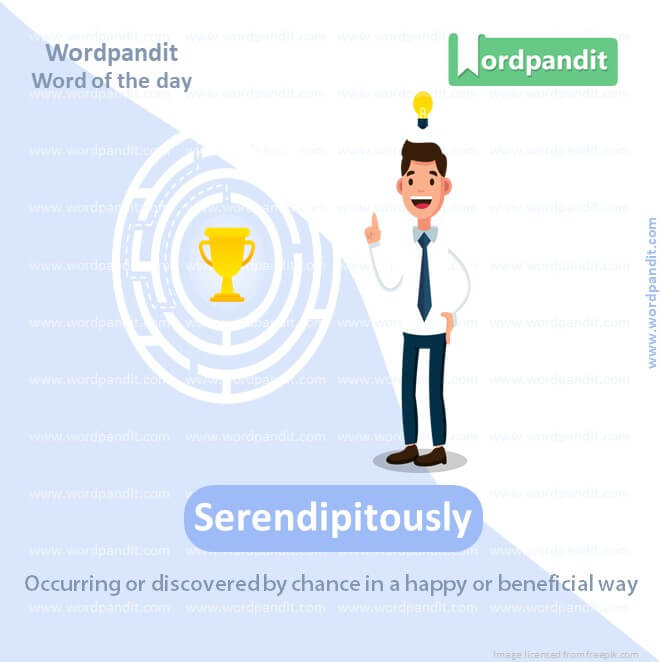
WORD-5: Serendipitously
CONTEXT: The scientist discovered the drug’s potential new usage, serendipitously, while studying for a different drug.
SOURCE: The Economic Times
EXPLANATORY PARAGRAPH: Imagine you found a candy on the street when you least expected it. That’s serendipity! And when something happens in that surprise, happy way, we say it happened “serendipitously”.
MEANING: Occurring or discovered by chance in a happy or beneficial way (adverb).
PRONUNCIATION: ser-en-dip-IT-uh-slee
SYNONYMS: Accidentally, Unexpectedly, Coincidentally, Fortuitously, Randomly, By chance, Unplanned
USAGE EXAMPLES:
1. She serendipitously found her lost ring while gardening.
2. They met serendipitously at a coffee shop.
3. He discovered the solution to the problem serendipitously.
4. The weather cleared up serendipitously just before the outdoor event.
WORD-6: Glittering
CONTEXT: The glittering ceremony of the Filmfare Awards saw all the stars descend for the grand night.
SOURCE: Mint
EXPLANATORY PARAGRAPH: Imagine your favorite shiny toy or a star in the night sky. When something shines and sparkles brightly, we say it’s “glittering”.
MEANING: Shining with a shimmering or flashing light (adjective).
PRONUNCIATION: GLIT-er-ing
SYNONYMS: Shimmering, Sparkling, Twinkling, Gleaming, Glistening, Radiant, Scintillating
USAGE EXAMPLES:
1. She wore a glittering dress to the party.
2. The city skyline was glittering with lights.
3. He received a glittering award for his achievements.
4. The night was filled with glittering stars.
WORD-7: Pugnacious
CONTEXT: The pugnacious rhetoric between the two countries has escalated, causing international concern.
SOURCE: Hindustan Times
EXPLANATORY PARAGRAPH: You know how some dogs bark and seem ready to argue or fight with other dogs? That’s what “pugnacious” means. It’s when someone really likes to argue or fight.
MEANING: Eager to argue or fight (adjective).
PRONUNCIATION: pug-NAY-shus
SYNONYMS: Aggressive, Combative, Belligerent, Quarrelsome, Contentious, Feisty, Bellicose
USAGE EXAMPLES:
1. The player had a pugnacious attitude on the field.
2. His pugnacious nature often got him into trouble.
3. Despite her small size, she had a pugnacious spirit.
4. The debate turned heated due to his pugnacious approach.
WORD-8: Indoctrination
CONTEXT: The author accused the education system of indoctrination, rather than promoting independent thought among students.
SOURCE: Indian Express
EXPLANATORY PARAGRAPH: Imagine you have a robot, and you teach it only what you want it to know, nothing else. Indoctrination is like that, but with people. It’s when someone is taught to believe something without questioning it.
MEANING: The process of teaching a person or group to accept a set of beliefs without questioning them (noun).
PRONUNCIATION: in-DOCK-tri-nay-shun
SYNONYMS: Brainwashing, Propaganda, Programming, Training, Inculcation, Instruction, Teaching
USAGE EXAMPLES:
1. The cult was known for its strict indoctrination of new members.
2. Parents were worried about the school’s apparent indoctrination.
3. He resisted the indoctrination of the extremist group.
4. Some regimes use indoctrination to control their citizens.
WORD-9: Pivotal
CONTEXT: The role of digital transformation has proven pivotal in navigating the ongoing pandemic by businesses.
SOURCE: The Economic Times
EXPLANATORY PARAGRAPH: Imagine a big door and it turns on a small point called a hinge. That hinge is super important for the door to move. “Pivotal” is a word we use when something is very, very important, just like that hinge.
MEANING: Of crucial importance related to the development or success of something (adjective).
PRONUNCIATION: PIV-uh-tal
SYNONYMS: Crucial, Critical, Central, Vital, Key, Fundamental, Essential
USAGE EXAMPLES:
1. Her findings were pivotal to the research.
2. It was a pivotal moment in the game.
3. The decision had a pivotal role in shaping the company’s future.
4. His support was pivotal in her election victory.
WORD-10: Soaring
CONTEXT: Despite the economic slump, the stock market seems to be soaring to new heights.
SOURCE: Mint
EXPLANATORY PARAGRAPH: Imagine a bird flying really high in the sky, way above the trees and mountains. When something goes up really high, we say it’s “soaring”.
MEANING: Flying or rising high in the air (verb/adjective).
PRONUNCIATION: SOAR-ing
SYNONYMS: Ascending, Climbing, Rising, Shooting up, Skyrocketing, Elevating, Uplifting
USAGE EXAMPLES:
1. The eagle was soaring above the mountains.
2. His confidence was soaring after the compliment.
3. The prices of the stocks were soaring.
4. With the release of their new song, the band’s popularity started soaring.
Vocabulary Synonyms
In the intricate weave of language learning, ‘vocabulary synonyms’ emerge as a key element that adds depth and variety to expression. These different words with similar meanings enrich our vocabulary, enabling us to communicate with precision and clarity. However, grasping ‘vocabulary synonyms’ successfully warrants a systematic approach.
When approaching ‘vocabulary synonyms’, context is your compass. Engage with various reading materials like novels, newspapers, and digital content to explore and understand how these synonyms are used in different situations. This exposure will fortify your comprehension of ‘vocabulary synonyms’ and their usage nuances.
Employing memory-enhancing techniques can cement your grasp on ‘vocabulary synonyms’. Employing flashcards is an effective method where one side contains the word you know, and the other side has its synonyms. Also, creating mind maps, linking the known word to its various synonyms, can be an engaging way to learn ‘vocabulary synonyms’.
To master ‘vocabulary synonyms’, take an active role in application. Regular conversations, written communications, digital interactions – all of these offer ample opportunities to utilize learnt synonyms. This practice refines your application and accelerates internalization of ‘vocabulary synonyms’.
Embracing language exchange platforms or engaging with native speakers can provide invaluable feedback on the usage of ‘vocabulary synonyms’. This interaction can further enhance your understanding of the cultural idiosyncrasies of word usage.
In conclusion, learning ‘vocabulary synonyms’ is a rewarding pursuit that adds layers of complexity to your language skills. A thoughtful blend of diversified resources, memory tools, practice, and interactive learning can make the task of mastering ‘vocabulary synonyms’ an enjoyable and fruitful journey. Every synonym learnt paints your vocabulary with different shades of understanding, making your language canvas all the more vivid and spectacular!











